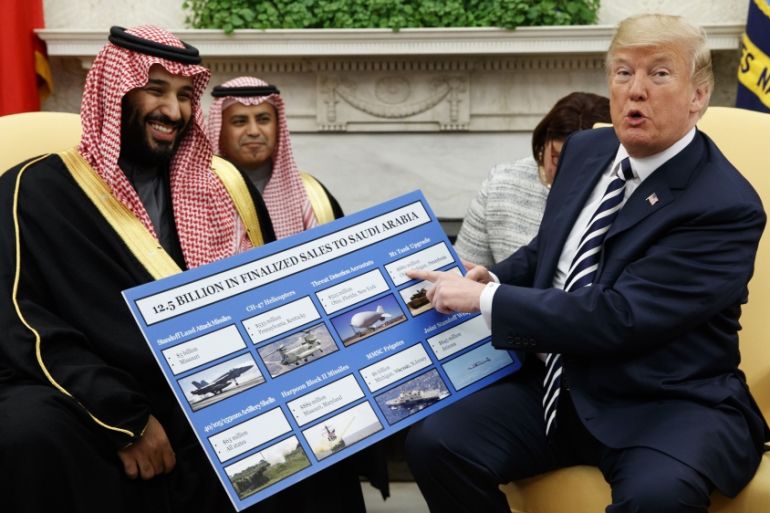In another rebuke to Trump, Senate votes to block Saudi arms sale
US Senate rejects Trump’s plan to bypass Congress to complete $8bn in arms sales to Saudi Arabia and other countries.

Washington, DC – The US Senate on Thursday delivered another strong rebuke of President Donald Trump‘s handling of the US relationship with Saudi Arabia, expressing disapproval of the administration’s move to bypass Congress to complete eight billion dollars in US weapons sales to the kingdom.
The 53-45 vote rejects Trump’s claim that “emergency” circumstances require the United States to provide Riyadh more precision-guided bombs because of “Iranian threats”.
Senator Bob Menendez, a top Democrat leader on foreign affairs, and Senator Lindsey Graham, a Republican and political ally of Trump, led the challenge to the Saudi arms sales.
“These weapons won’t counter Iranian threats. This is all about using them in Yemen,” Menendez said in remarks to the Senate on Wednesday.
Trump and his advisers used the emergency declaration to bypass a requirement in the Arms Export Control Act that Congress approve such arms sales amid growing opposition by politicians to providing US precision-guided weapons to Saudi Arabia.
The planned sale also provides for co-production and manufacture of hi-tech bomb components in Saudi Arabia for the first time.
Outrage over Yemen, Khashoggi
The vote shows continuing bipartisan political opposition within Congress to the White House’s “business as usual with Saudi Arabia” approach. It is unclear if there would be enough votes to overcome a likely Trump veto of the measure should it make it to his desk.
Senate Republicans, however, are preparing legislation to impose new parameters on the US-Saudi strategic relationship, including potential financial sanctions on persons involved in the killing of Saudi journalist Jamal Khashoggi.
US legislators have grown increasingly uncomfortable with the Saudi-UAE aerial bombing campaign in Yemen that has caused thousands of deaths and a severe cholera outbreak.
“What’s happening in Yemen is a humanitarian disaster that has been exacerbated by the very weapons we have been giving the Saudis,” Menendez said.
Outrage in Congress peaked after the former Washington Post columnist Khashoggi was killed in October 2018 in the Saudi consulate in Istanbul. The CIA has concluded Saudi Crown Prince Mohammed bin Salman (MBS) played a role in the assassination of Khashoggi, who had been critical of Saudi human rights abuses. Saudi officials have rejected that conclusion.
In a long-anticipated report released on Wednesday, UN extrajudicial executions investigator Agnes Callamard said Khashoggi’s death “constituted an extrajudicial killing for which the State of the Kingdom of Saudi Arabia is responsible” and said MBS should be investigated.
“This report has reignited and even deepened the concern about why this administration seems incapable of holding Saudi Arabia accountable,” Menendez said, citing its “horrific details” about a discussion between the killers of how to cut up Khashoggi’s body.
Trump has declined to apply available US sanctions under the Global Magnitsky Act to the Saudi government for Khashoggi’s killing.
Since the murder, the administration gave a regulatory green light to US companies to offer the sale of nuclear power technology to Saudi Arabia, despite concerns it could lead to Saudi development of nuclear weapons.
|
|
Separately, Secretary of State Mike Pompeo recently blocked the inclusion of Saudi Arabia on a forthcoming US list of countries that recruit child soldiers, dismissing State Department experts’ findings that the Saudi-led coalition in Yemen has been using under-age fighters, Reuters News Agency reported, citing unnamed people familiar with the matter.
Trump vetoed a resolution in April that would have withdrawn US military support for the Saudi-UAE war in Yemen. Politicians in Congress were not able to come up with enough votes to override the veto.
Tensions with Iran
R Clarke Cooper, the State Department’s assistant secretary of state for political-military affairs, defended the arms sales in an appearance last week before the House Foreign Affairs Committee, saying the weapons were necessary to reassure US allies in the Gulf faced with Iranian aggression.
Thursday’s vote came just hours after Iran’s Islamic Revolutionary Guard Corps (IRGC) shot down a US drone.
The IRGC said the drone was downed after it flew into Iranian airspace. US officials rejected those claims, saying the drone was in international territory at the time.
US President Trump tweeted after the downing of the drone that “Iran made a very big mistake!”
When asked by reporters if the US will attack Iran, Trump said, “you’ll soon find out”, US media reported later on Thursday.
As tensions between Iran and the US escalate in the Gulf, Democrats have expressed concern that the US president may launch a military confrontation with Iran without consulting Congress.
On Thursday, House Speaker Nancy Pelosi, the top Democrat in Congress, said that the US has no appetite to go to war with Iran.
Separately on Thursday, the UK court of appeal ruled that British arms sales to Saudi Arabia for use in Yemen were unlawful – a decision campaigners called “historic”.